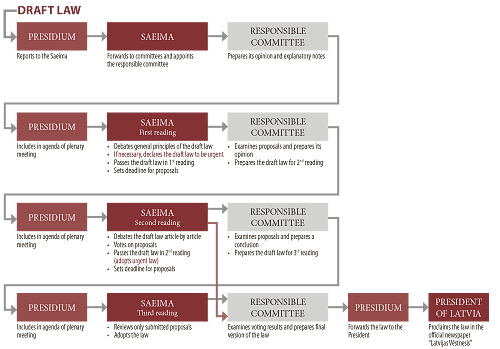Procedure for adopting laws
The Saeima is the legislature of the Republic of Latvia. It is the only public authority in Latvia with the right to adopt laws. Draft laws may be submitted to the Saeima by the President of Latvia, the Cabinet of Ministers, committees of the Saeima, at least five MPs, and, in accordance with the procedure and to the extent set forth by the Constitution, at least one tenth of the electorate.
Draft laws are submitted to the Presidium of the Saeima. During a plenary sitting, the Presidium reports to the Saeima on the draft laws submitted, and the Parliament votes on forwarding the draft law to the committee responsible for its progress.
A legislative procedure involving multiple readings
For a law to enter into effect, it must be considered in three readings by the responsible committee and the Saeima; on certain occasions, draft laws may be considered in two readings. Draft laws recognised as urgent may be considered by the Saeima in two readings. In addition, the state budget, laws on the medium‑term budget framework, amendments to these laws, and laws on adopting international treaties are considered in two readings.
A special procedure for amending the Constitution
Amendments to the Constitution (the Satversme) are always considered in three readings. At least two thirds of MPs (not less than 67 MPs) must be present. Amendments to the Constitution are adopted by not less than a two‑thirds majority vote of the MPs present.
Consideration of draft laws in committee meetings and plenary sittings
In the first reading at the committee meeting and the plenary sitting, MPs only consider the concept of the draft law, namely, the draft law as a whole without changing the wording. Not only MPs and relevant public authorities, but also experts and representatives of the society participate in committee meetings and discuss draft laws. However, only members of the responsible committee may vote on a draft law.
When considering a draft law at a plenary sitting of the Saeima, MPs may make a decision with a majority vote of at least half of the Members present (not less than 50 MPs). If a draft law is supported by the Saeima, a deadline for submitting proposals for the next reading is set.
During the second and third readings at the committee meeting and the Saeima sitting, MPs debate on proposals submitted regarding specific articles or their parts. Proposals on amendments to a draft law may be submitted by a committee of the Saeima, a parliamentary group, individual MPs, as well as the President, Prime Minister, Deputy Prime Minister, a minister, the parliamentary secretary of a ministry (authorised by the respective minister), and the Ombudsman. Proposals related to the legislative technique, codification, and conformity of the proposed wording with existing laws are submitted by the Legal Bureau of the Saeima. Only the responsible committee may submit proposals on the draft law beyond the set deadline. After examining all the submitted proposals, MPs vote on the draft law as a whole.
A law adopted by the Saeima comes into effect only after it has been promulgated by the President. A law enters into force 14 days after its promulgation, unless specified otherwise in the law itself.
Reconsideration of a draft law
According to the Constitution, the President has the right to veto a law, namely, request its reconsideration or suspend its proclamation in accordance with a specific procedure.
If a draft law has been returned to the Saeima for reconsideration, the Parliament, without debate, forwards the reasoned objections by the President to the responsible committee and decides on a deadline for submitting proposals and reconsidering the draft law. The Saeima reconsiders a draft law according to the procedure for considering a draft law in the third reading. During the reconsideration, the Parliament only considers objections made by the President and proposals relevant to the objections made by the President.
If the Saeima, by not less than a two‑thirds majority vote, determines a law to be urgent and the law is adopted in two readings, the President may not request its reconsideration, and the adopted law is to be proclaimed no later than within three days after the President has received it.
Procedure for adopting laws
Procedure for adopting laws (.pdf)






